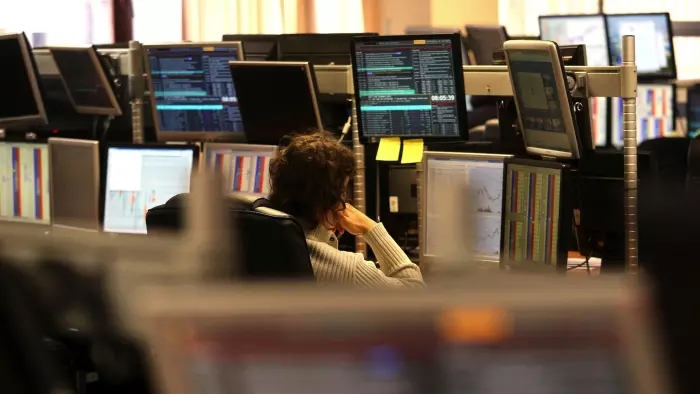
Global rates have moved modestly lower overnight after another batch of weak European PMIs.
The market now awaits the ECB meeting tonight, where the central bank is expected to remain on hold but foreshadow easing measures in September.
The S&P500 and NASDAQ have pushed higher, helped by generally better than expected US earnings results.
Currency moves have been contained, with the AUD the notable underperformer over the past 24 hours.
Ahead of the ECB meeting tonight, the closely-watched European Manufacturing PMIs fell further in July, signalling that the manufacturing sector in Germany and Europe remains mired in contractionary territory. The Euro Area-wide Manufacturing PMI fell to 46.4, its lowest level since the end of 2012, while the German version fell to just 43.1, both much weaker than market expectations. In contrast to the weakness affecting the manufacturing sector, services activity has continued to hold up better. Both the European and German Services PMIs were close to market expectations and remained firmly in expansionary territory. The weakness in manufacturing meant the composite European PMI was lower than expected.
Germany bund yields fell to even more negative levels after the data was released, with the Feb-29 bund yield falling 2bps to an all-time low of -0.42%. The 10 year US Treasury yield fell 3bps to 2.05%. The bigger moves were again seen in peripheral European bond markets, with the 10 year Italian bond yield falling 11bps to below 1.5%, its lowest level since late 2016. The prospect of new ECB easing measures and investor aversion to negative rates (around 25% of the global investment-grade bond universe is currently trading with negative yields) has been strongly supportive of higher yielding segments of the European bond market.
The ECB meets tonight and is expected to foreshadow new easing measures, likely to be announced at the September meeting. The market prices a 40% chance of a (10bp) reduction to the cash rate at this meeting, but the vast majority of economists expect the central bank to hold off until September before cutting rates. Instead, the ECB is expected to change its forward guidance to say rates will remain at their present levels, or lower, at least through the first half of 2020. The ECB is also expected to accompany the next rate cut with a deposit tiering system, in an effort to mitigate the negative impact on bank profitability.
In the US, the manufacturing PMI also disappointed expectations, falling to its lowest level since September 2009, and sitting right on the 50 threshold that divides contraction from expansion. The market tends to pay more attention to the ISM manufacturing survey, which is released late next week and is expected to show a slightly more healthy 52.1 reading. Meanwhile, the US Services PMI was slightly better than expected. The current juncture – weakness in manufacturing and a more resilient services sector – has parallels with early 2016, the last time the market fretted about a possible recession but which ultimately proved to be unfounded.
The S&P500 (+0.3%) and NASDAQ (+0.6%) have moved higher overnight, with the latter making a new record high, despite the US Department of Justice announcing an investigation into possible anticompetitive behaviour among the tech giants. Google, Facebook, Apple and Amazon, which are expected to be the targets of the investigation, were slightly lower on the day, but these were more than offset by gains elsewhere. The prospect of easing from the Fed later this month continues to provide underlying support for equities.
US earnings results were generally better than expected, including from delivery/logistics company UPS. In contrast, industry bellwether Caterpillar fell 4% after it reported lower than expected earnings, a further sign that the trade war has hitting the manufacturing sector. Despite weaker sales of construction equipment in China, Caterpillar said overall demand remained positive and it expected “modest sales growth for the year.” Around a quarter of the S&P 500 has reported earnings so far, with 78% beating analyst expectations.
In FX, the USD indices were unchanged overnight, with the DXY and Bloomberg DXY both continuing to trade near one-month highs. US Treasury Secretary Mnuchin told CNBC that he would not advocate a weak dollar policy in the near-term and that, in the long-run, he believed in a strong dollar (“which signifies a strong U.S. economy, a strong stock market”). The comments are unlikely to completely quell speculation that Trump might push the US Treasury to intervene in the FX market at some point, although such a move seems very unlikely in the near-term.
The weaker than expected European PMIs led to a small fall in the EUR (-0.15%), which is sitting just above key support around 1.11. The GBP has outperformed (+0.3%), despite Boris Johnson’s confirmation as the new Prime Minister. Sajid Javid has been named as the new Chancellor while Brexiteer Dominic Raab is the new foreign secretary, replacing Johnson’s PM opponent Jeremy Hunt.
The AUD has been the notable underperformer over the past 24 hours after Westpac changed its call on the RBA, calling for a 0.5% low in the cash rate in February, and iron prices fell. The OIS curve implies a 20% chance of a 25bp cut in August and is fully priced for the next cut in November (October 77%). The market will look to RBA Governor Lowe’s speech today, entitled Inflation Targeting and Economic Welfare, for more guidance and CPI next week is the next major data point. The NZD is little changed from this time yesterday, seeing the NZD/AUD cross re-test its recent highs. The cross currently trades at 0.9615.

We welcome your comments below. If you are not already registered, please register to comment
Remember we welcome robust, respectful and insightful debate. We don't welcome abusive or defamatory comments and will de-register those repeatedly making such comments. Our current comment policy is here.